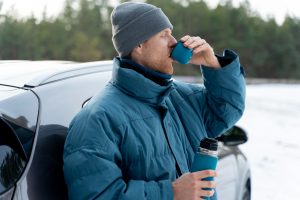How to Combat Dehydration in Chilly Weather
January 17, 2025

Dehydration is often associated with hot summer months, but it’s equally important to stay hydrated during winter. Chilly weather can deceptively reduce our perception of thirst, leading to reduced water intake and a range of physiological challenges. Understanding the science behind hydration in cold weather and adopting proactive strategies can help prevent dehydration and its consequences.
Why Dehydration Occurs in Winter
Dehydration in winter is driven by several factors:
Reduced Thirst Response: Cold temperatures suppress thirst signals, making individuals less likely to drink water. Studies show that the body’s sensation of thirst decreases by up to 40% in colder environments.
Increased Water Loss: Winter air is typically dry, and indoor heating systems exacerbate the dryness. This leads to higher rates of water loss through skin and respiration. Every breath exhaled in cold weather contains moisture, contributing to gradual dehydration.
Layered Clothing: Wearing multiple layers of clothing increases sweat production, particularly during physical activity. However, because sweat evaporates quickly in dry, cold air, it often goes unnoticed.
Winter Activities: Activities such as skiing, snowboarding, and hiking in cold climates require physical exertion, further increasing water loss.
Signs of Dehydration
Dehydration can manifest subtly during winter. Key symptoms to watch for include:
- Dry skin and chapped lips
- Fatigue or lethargy
- Dark-colored urine or decreased urine output
- Headaches and dizziness
- Difficulty concentrating
- Dry or scratchy throat
Ignoring these signs can lead to more severe dehydration, which can impair physical and cognitive performance, reduce immunity, and increase susceptibility to cold-related illnesses.
The Role of Hydration in Winter Health
Adequate hydration is essential for maintaining various physiological processes, including:
Regulating Body Temperature: Even in cold weather, the body’s temperature regulation mechanisms require sufficient water to function optimally.
Supporting Immune Function: Proper hydration helps maintain the integrity of mucous membranes, which act as a barrier against respiratory infections—common in winter months.
Promoting Skin Health: Dry, winter air can strip moisture from the skin. Hydration from within complements external moisturizers, reducing the risk of flaky, irritated skin.
Enhancing Cognitive Performance: Dehydration is linked to decreased cognitive abilities, such as memory, attention, and decision-making—all critical during daily tasks and winter sports.
Strategies to Stay Hydrated in Winter
Maintaining hydration during cold weather requires conscious effort and strategic planning. Here are scientifically backed methods to combat dehydration:
Monitor Water Intake
The recommended daily water intake varies by age, gender, and activity level, but a general guideline is 2.7 liters for women and 3.7 liters for men, according to the National Academies of Sciences, Engineering, and Medicine. Keep track of your water consumption using apps, refillable bottles with markers, or setting reminders.
Warm Beverages Count
While cold water may be unappealing in winter, warm drinks such as herbal teas, broths, and hot water with lemon are excellent hydration options. They not only contribute to your fluid intake but also help maintain body temperature.
Incorporate Water-Rich Foods
Many fruits and vegetables have high water content and can supplement hydration. Examples include:
- Cucumbers (95% water)
- Oranges (88% water)
- Broccoli (89% water)
- Soups and stews made with water-based broths
Adjust for Activity Levels
If engaging in winter sports or other physical activities, increase your water intake to compensate for sweat loss. Aim to drink water before, during, and after the activity.
Avoid Overloading on Diuretics
Beverages like coffee, black tea, and alcohol can have diuretic effects, promoting water loss. While moderate consumption is generally fine, ensure these drinks are balanced with water or other hydrating fluids.
Use a Humidifier
Dry indoor air from heating systems can exacerbate water loss through the skin and respiratory system. Using a humidifier helps maintain moisture levels in your environment, reducing dehydration risk.
Listen to Your Body
Pay attention to subtle cues such as dry mouth, decreased urination, or fatigue. These may indicate the need for more fluids, even if you don’t feel thirsty.
Special Considerations
Certain populations are more vulnerable to winter dehydration and should take extra precautions:
- Elderly Individuals: Aging reduces the body’s ability to sense thirst and conserve water. Encourage older adults to drink fluids regularly, even if they don’t feel thirsty.
- Children: Active children can lose water quickly through play and may not realize they are dehydrated. Offer water or hydrating snacks frequently.
- People with Chronic Conditions: Conditions like diabetes or kidney disease can increase the risk of dehydration. These individuals should consult their healthcare provider for personalized hydration guidelines.
Benefits of Staying Hydrated in Winter
Combating dehydration in chilly weather has numerous benefits:
- Improved Energy Levels: Proper hydration combats fatigue, helping you stay active and alert.
- Better Physical Performance: Hydration ensures optimal muscle function and reduces the risk of cramps during winter sports.
- Enhanced Skin Barrier: Hydrated skin is less prone to dryness, irritation, and cracking.
- Stronger Immunity: Adequate fluid levels support a robust immune response, reducing susceptibility to colds and flu.
Staying hydrated in winter is as critical as it is in summer, despite the reduced perception of thirst. By understanding the unique challenges posed by chilly weather and implementing practical strategies, you can ensure your body functions optimally throughout the season. Remember, hydration is not just about quenching thirst but maintaining overall health and well-being. So, drink up and enjoy the beauty of winter without compromising your health.
Need more topics related to health and wellness? Check out this section: https://lifelonglabs.com/wellness/
Of course, don’t forget to follow us on Instagram, Facebook, LinkedIn, and YouTube to get your daily dose of wellness, longevity and leadership inspiration!
MEDIA RESOURCES
Media Inquiry? Contact Public Relations
CONNECT WITH US
Video
Lifelong Labs Helps People Live Longer, Healthier and Happier
SUBSCRIBE
Subscribe now and unlock the secret to reversing aging!
By clicking “Subscribe” you agree to our Privacy Policy and consent to contact you about our relevant content, products and services.

